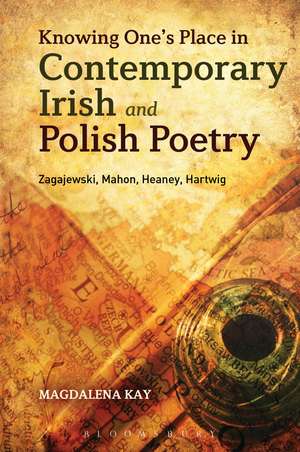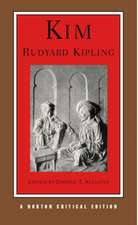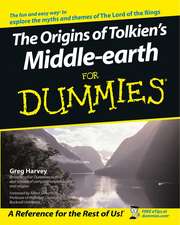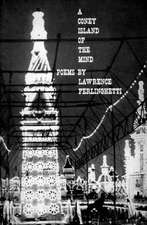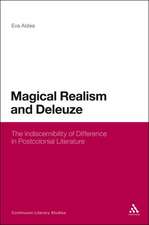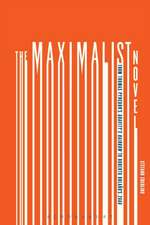Knowing One's Place in Contemporary Irish and Polish Poetry: Zagajewski, Mahon, Heaney, Hartwig
Autor Dr. Magdalena Kayen Limba Engleză Hardback – 25 apr 2012
| Toate formatele și edițiile | Preț | Express |
|---|---|---|
| Paperback (1) | 257.59 lei 6-8 săpt. | |
| Bloomsbury Publishing – 2014 | 257.59 lei 6-8 săpt. | |
| Hardback (1) | 831.83 lei 6-8 săpt. | |
| Bloomsbury Publishing – 25 apr 2012 | 831.83 lei 6-8 săpt. |
Preț: 831.83 lei
Preț vechi: 1197.48 lei
-31% Nou
Puncte Express: 1248
Preț estimativ în valută:
159.17€ • 173.44$ • 134.12£
159.17€ • 173.44$ • 134.12£
Carte tipărită la comandă
Livrare economică 23 aprilie-07 mai
Preluare comenzi: 021 569.72.76
Specificații
ISBN-13: 9781441116420
ISBN-10: 1441116427
Pagini: 272
Dimensiuni: 150 x 231 x 23 mm
Greutate: 0.5 kg
Ediția:New.
Editura: Bloomsbury Publishing
Colecția Continuum
Locul publicării:New York, United States
ISBN-10: 1441116427
Pagini: 272
Dimensiuni: 150 x 231 x 23 mm
Greutate: 0.5 kg
Ediția:New.
Editura: Bloomsbury Publishing
Colecția Continuum
Locul publicării:New York, United States
Caracteristici
Consideration of a popular topic (belonging and place) as seen in a new light
Notă biografică
Magdalena Kay is Associate Professor of English at the University of Victoria, Canada. She holds a Ph.D. in Comparative Literature from the University of California, Berkeley, and B.A. in English from Harvard University. She is the author of In Gratitude for All the Gifts:Seamus Heaney and Eastern Europe (University of Toronto Press, forthcoming 2012) and has published articles in journals such as World Literature Today, New Hibernia Review, An Sionnach, Canadian Journal of Irish Studies, Polish Review, Comparative Literature Studies and Comparative Literature.
Cuprins
Introduction. The Margins of Europe: A New Comparison
Chapter 1. The Dynamic Ideal and the Protean Self: Adam Zagajewski
Chapter 2. Figuring Otherness in the Work of Adam Zagajewski
Chapter 3. Belonging on the Edge: Derek Mahon's Outsider Poetics
Chapter 4. Inhabiting the Earth: Derek Mahon's Dissonances and Harmonies
Chapter 5. Belonging as Mastery in the Poetry of Seamus Heaney
Chapter 6. Examining the Structures of Selfhood: Seamus Heaney
Chapter 7. Holding One's Self Outside: Julia Hartwig
Chapter 8. Learning to Speak from Inside: Julia Hartwig
Conclusion. Knowing One's Self
Bibliography
Index
Chapter 1. The Dynamic Ideal and the Protean Self: Adam Zagajewski
Chapter 2. Figuring Otherness in the Work of Adam Zagajewski
Chapter 3. Belonging on the Edge: Derek Mahon's Outsider Poetics
Chapter 4. Inhabiting the Earth: Derek Mahon's Dissonances and Harmonies
Chapter 5. Belonging as Mastery in the Poetry of Seamus Heaney
Chapter 6. Examining the Structures of Selfhood: Seamus Heaney
Chapter 7. Holding One's Self Outside: Julia Hartwig
Chapter 8. Learning to Speak from Inside: Julia Hartwig
Conclusion. Knowing One's Self
Bibliography
Index
Recenzii
"Through a careful and extensive examination of both Polish and Irish poetries and their prominent contemporary voices, Magdalena Kay's book offers excellent insight into the sense of identity and belonging as filtered through poetic meditation. Her highly nuanced reading, founded on the consequences of history for an individual consciousness and its creative expression, is driven by the imperative of respect for poetic singularity; indeed, seldom does one encounter this kind of synchrony between a critic and a poet. Her eloquently written and coherently structured book adds a new and original perspective to the emerging field of Irish-Polish comparison." -- Bozena Shallcross, Associate Professor of Polish Literature, University of Chicago, USA
A well-balanced approach . . . Kay's book is valuable insofar as it points out [its] omissions and attempts to rectify them by inviting more dialogue between East and West, thereby decreasing the gap that is ultimately the best justification for Kay's book
A well-balanced approach . . . Kay's book is valuable insofar as it points out [its] omissions and attempts to rectify them by inviting more dialogue between East and West, thereby decreasing the gap that is ultimately the best justification for Kay's book
